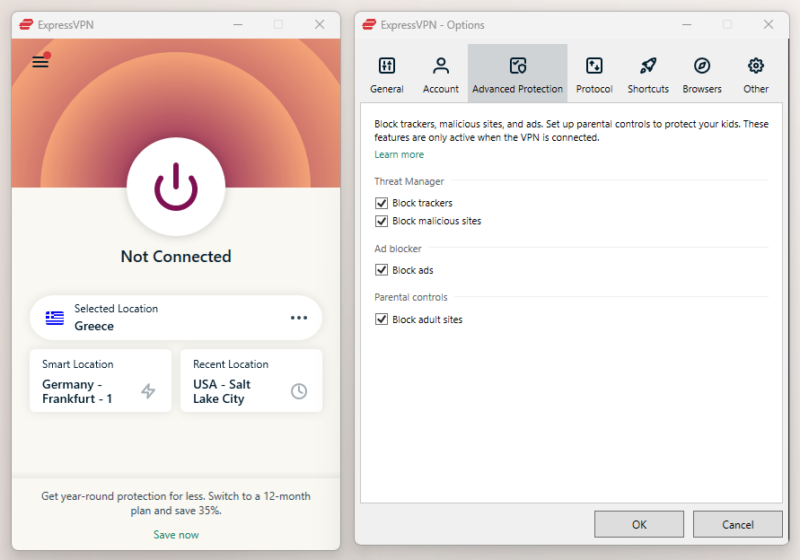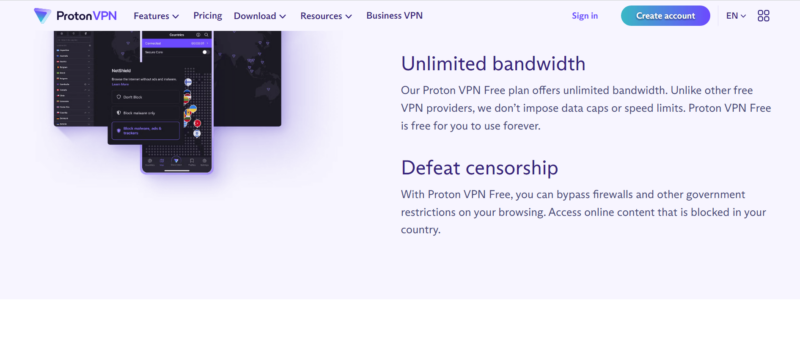Is Torrenting Safe With a VPN? A Full Guide in 2025
Is torrenting safe? Read this guide to learn the risks of torrenting and how a reliable VPN can mitigate them. We also cover the legality of torrenting worldwide, the best VPN protocols, and the top free and paid VPNs for torrenting.
We’re often asked the question “is torrenting safe?” Our experts can tell you that visiting torrent websites or downloading files using a torrent client exposes you to security risks. You can inadvertently download malicious files or unknowingly leak your real IP address. However, this doesn’t mean you cannot download torrent files safely.
Torrenting can be safe if you encrypt your web traffic, hide your IP address with one of the best VPNs like ExpressVPN or NordVPN, and protect your device from malicious torrent sites. We know you’re eager to learn how to download torrents safely, so let’s get started.
-
08/22/2024 Facts checked
We have rewritten our is torrenting safe with a VPN article to include new information and use an easier-to-read format.
-
10/01/2024 Facts checked
We optimized this article’s user guide and recalibrated the VPN rankings for accuracy.
-
11/29/2024 Facts checked
Revised VPN ranking to better reflect torrenting capabilities.
What Is Torrenting?
Torrenting is a type of peer-to-peer (P2P) file sharing in which you download and upload files using the BitTorrent protocol. Torrenting downloads parts of a file from multiple users in the network. At the same time, you upload parts of the file for others to download. Once you have all the parts, the complete file becomes available on your device.
To download a file through torrenting, you need a torrent client like qBitTorrent or uTorrent and a torrent file. The torrent file includes metadata explaining which file will be downloaded and where to find it. We explain everything you need to know about torrenting in our detailed guide.
Is Torrenting Safe With VPN Providers?
Yes, it is safer to torrent with VPN providers. A reliable VPN encrypts your web traffic and routes your DNS queries through its private DNS server. As a result, your ISP won’t know what you’re doing online.
A VPN hides your actual IP address, reducing the risk of hackers exploiting it. Many VPNs protect you from malware, adware and scareware when visiting torrent websites, and can scan downloaded files for malware and viruses.
A VPN can also help you bypass ISP throttling and unblock torrent websites successfully if your ISP or local government has blocked them.
Some VPNs include a dark web monitor that alerts you if your credentials appear in leaked databases. Though this doesn’t directly protect you while torrenting, it can let you know if a sketchy torrent file contained malware that compromised your credentials.
Not all VPN services protect you to the same extent while torrenting. Only a handful of VPN providers have the full list of security features you need.
Best VPN for Torrenting
We have tested the best VPNs for torrenting, and we found that ExpressVPN is the best option. That’s because of its zero-logs policy, its large server distribution, its ad blocker and “threat protection” features, and its dedication to allowing P2P traffic on every server in its expansive network.
VPNs are known to slow down internet speeds. However, we have tested leading VPNs and found that top services like ExpressVPN and NordVPN reduce download and upload speeds of less than 10%. Read our VPN speed comparison guide to learn more about how we tested leading VPN providers for speed.
We’ve tested popular VPNs and highlighted key features to help you pick the best VPN for torrenting. We provide more information about each VPN provider below.
Torrenting With Premium VPNs
Downloading files over a P2P network is risky even if you visit the best torrent websites and use one of the best torrent clients. We explored leading premium VPN providers to determine whether they are safe for torrenting.
Is ExpressVPN Safe for Torrenting?
Because of its many security features and long record of protecting user privacy, we’re prepared to say that torrenting with ExpressVPN is safe. It includes a threat manager that blocks your device’s connection to trackers and malicious websites.

Thanks to its Lightway protocol, ExpressVPN has some of the fastest download speeds on the market. ExpressVPN uses TrustedServer technology, which is another term for RAM-only servers. This feature wipes data on servers each time they are rebooted. This enforces its strict zero-logs policy and ensures your data remains private.
Additionally, ExpressVPN routes DNS queries through its encrypted private DNS, preventing the possibility of DNS leaks. Check out our ExpressVPN review for a more detailed examination of its features. You can try ExpressVPN with its 30-day money-back guarantee.
Is NordVPN Safe for Torrenting?
Based on the hands-on experience we gathered from writing our NordVPN review, we can affirm that NordVPN is safe for torrenting. NordVPN’s “threat protection pro” feature, available for Windows and macOS, blocks malicious torrent websites and trackers, removes intrusive ads, scans downloaded files for malware and warns of vulnerable apps on devices.

However, the Android, iOS, Linux, Windows and macOS browser extension is limited to “threat protection,” which blocks only malicious and phishing domains. NordLynx, NordVPN’s proprietary protocol, offers enhanced security and faster speeds. In our VPN speed tests, we found NordVPN to be the fastest.
Additionally, NordVPN has a private DNS server to prevent DNS leaks and DNS hijacking. If your login data is leaked to the dark web, NordVPN’s dark web monitor feature will alert you, allowing you to take proactive steps to protect your information. With these security features, you can confidently use NordVPN for torrenting — it comes with a 30-day refund period.
Is It Safe to Use Proton VPN for Torrenting?
Proton VPN is one of the best VPNs on the market, and it does offer a limited free plan that you could use for torrenting. The free plan has no data limits, allowing you to torrent without worrying about download speed or file sizes.

However, the free Proton VPN plan lacks an ad blocker and malware protection. This makes visiting torrenting sites risky. Additionally, the free version has a limited number of servers and you can’t choose which server you use. Finally, the free servers are not optimized for P2P sharing.
All in all, we suggest opting for a Proton VPN paid plan over the free one if you’re torrenting, but the free version can do in a pinch. We have written a detailed Proton VPN review after trying all its features.
Torrenting With Free VPNs
You can use a free VPN for torrenting, but there are caveats. Free VPNs often have limited P2P support, bandwidth and speed. They might also lack essential security features for safe torrenting. However, a free VPN is better than none at all, and a few of the best free VPNs do pass muster.
Can Windscribe Keep You Safe While Torrenting?
Windscribe is the free VPN that we most highly recommend for torrenting. Its free plan comes with an ad and malware blocker, and it doesn’t have any bandwidth limit. You can use it to safely torrent, though it’s missing advanced security features, such as real-time scanning when you download files.

Windscribe VPN’s free plan has a monthly data limit, so you cannot engage in unlimited torrenting. Additionally, Windscribe’s free plan has servers in only 11 countries, so you may not have the option to select a server of your choice for torrenting. You can find out more information in our full Windscribe review.
In a Proton VPN vs Windscribe comparison fight, Proton VPN’s free plan is the clear winner because it offers unlimited data.
Is Torrenting on Mobile Phones Safe?
Yes, torrenting is safe on mobile phones if you follow the required security measures — using a VPN and an antivirus program, selecting the right torrent client and being cautious of where your torrents are coming from.
We have tried and tested the best VPN apps for mobile and the best antivirus for Android devices. You can explore these tools to find the best protection for torrenting safely on your mobile phone.
Is Torrenting Illegal In Some Countries? Is It Safe?
The answer to the question of the legality of torrenting depends on what you’re torrenting. Downloading copyrighted movies, games and songs is illegal due to copyright violations. Governments worldwide have laws to punish copyright violators.
However, if you’re wondering is torrenting legal in itself, check out our full is torrenting illegal article. Below, we’ll look at some countries and their torrenting laws.
Risks of Torrenting Without a VPN
We don’t advise torrenting without a VPN. In this section, we will explore the critical risks associated with torrenting if you don’t use a reliable VPN.
How to Use a VPN for Torrenting Safely
Using a reliable VPN service for torrenting is a straightforward process. However, before you visit any torrent website to download torrents, you need to install an antivirus program on your device.
Once the latest version of the antivirus program is up and running on your device, follow the steps below.
- Install a torrent client on your PC.
- Subscribe to a reliable VPN service — we recommend ExpressVPN for torrenting.
- Install the VPN on your device, turn it on and connect to a server. Use a P2P-optimized server if available.
- Find the torrent file you intend to download.
- Fire up your torrent client and add the torrent file to start torrenting.
Set Up a VPN for Torrenting Safely
Reputable VPNs come with security features to help you download and share files securely through torrenting. Below is a quick guide to set up your VPN for torrenting.
- Turn on the kill switch before you start torrenting.
- Activate malware protection, ad blockers and tracker protection. As these security features vary from vendor to vendor, explore your VPN’s features thoroughly to ensure you have activated all the necessary security tools.
- Use the WireGuard VPN protocol for torrenting on a PC (or Lightway if you choose ExpressVPN) and IKEv2/IPsec for torrenting on a smartphone.
You can read our detailed guide to VPN features to learn about which ones are most important.
Which VPN Protocols Are the Best to Use While Torrenting?
Although OpenVPN and WireGuard are considered the two best VPN protocols, there are others you can consider while torrenting. Be careful about the protocol your VPN service uses, as it has a direct link to security and internet speeds. We’ve listed and compared all the popular VPN protocols being used today.
Safest Ways to Torrent
Torrenting is a great way to download public-domain content, but it comes with privacy concerns, copyright issues and the risk of malware infection. You can avoid these risks by taking appropriate security measures. We’ll cover some security measures below.
How to Check If a Torrent Is Safe
Though .torrent files aren’t harmful themselves, they can be used to spread malicious software. There is no foolproof way to ensure a .torrent music or video file is perfectly safe without downloading the material it points to. However, exercising caution can help you stay safe when dealing with torrent files.
Here are some helpful tips:
- Always download torrents from popular websites and check user reviews and comments to assess credibility.
- Use a VPN to protect yourself from malicious websites and scan torrent downloads for harmful files.
- Analyze downloaded materials in a sandbox to ensure safety.
- Use private torrent trackers, which are member-only websites with strict torrent upload policies.
You should also avoid suspicious torrent files to stay safe. If a file looks too good to be true, there is a high chance it’s a malware vector. For example, if a program hasn’t been released yet and you see that its torrent is available, the file is likely fake and malicious.
What Are the Best Torrenting Sites?
When looking for the best torrenting site, The Pirate Bay will normally be your first stop, but it’s frequently down and won’t always have what you want. There are also some torrent websites that are better for music, while others are excellent for movies and TV shows. Here are the top sites, according to the types of content they are best for:
- The Pirate Bay (TPB) — All types of content
- 1337x — Movies and TV shows
- YTS — Movies released by YIFY
- EZTVx — TV shows
- RuTracker — Music
- Library Genesis — eBooks
- FitGirl Repacks — Games
Final Thoughts
Torrenting is safe with a VPN, as long as you use a reliable one like ExpressVPN. A free VPN or proxy may not provide you with the protection you require while torrenting. Trying NordVPN for a month is completely risk-free, as you can use the 30-day money-back guarantee if you end up not liking it.
Sometimes, VPN and antivirus features can overlap. For instance, NordVPN comes with “threat protection pro” feature, which protects your device from malware, malicious websites and scareware. You should always use an antivirus program while torrenting for added security features, such as zero-day attack protection, ransomware remediation, crypto-mining protection and more.
Which VPN do you use while torrenting? Where do you download torrents from? Do you have any torrenting tips to share? Let us know in the comment section. As always, thanks for reading.
FAQ: Downloading Torrents Safely
Torrenting without a VPN is always risky. You could expose your IP address to threat actors or download infected files. Accidental downloads of copyrighted materials may also be traced back to you, which can lead to legal issues.
No, you won’t go to jail for torrenting public-domain content. However, downloading copyrighted material will land you a notice from copyright watchdogs, and in extreme cases, you could go to jail.
Yes, you can be tracked while torrenting. Without a VPN, your IP address can be traced to your internet service provider and potentially to you.
Yes, torrenting can be bad for your computer, even though torrents themselves don’t inherently include viruses. You cannot be sure that the files you download via torrents are free of malware and viruses. Torrent websites often have adware and scareware, increasing privacy and security risks.


